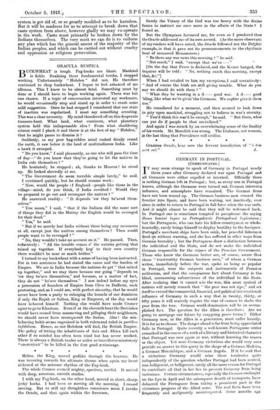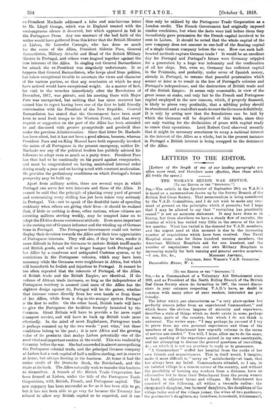GERMANIC IN PORTUGAL.
[COMMUNICATED.]
IT may seem strange to speak of Germany in Portugal nearly three years after Germany declared war upon Portugal and all Germans were either expelled or interned. Officially there is nothing German left in Portugal ; but, as every one in Portugal knows, although the Germans were turned out, German interests1 influence, and atmosphere have remained. The German firms have not been wound up. The German business men crossed the frontier into Spain, and have been waiting, not inactively, ever since in order to return to Portugal in full force when the war ends. And it might almost be said that they will be welcomed back. In Portugal one is sometimes tempted to paraphrase the saying Homo hornini lupus as Portugalensis Portugalensi lupissimus ; but the Portuguese, who can hate his fellow-countryman so whole- heartedly, rarely brings himself to display hostility to the foreigner. Portugal's merchant ships have been sunk, her peaceful fishermen fired. on without warning, and she has suffered in other ways from German brutality ; but the Portuguese draw a distinction between the individual and the State, and do not make the individual German responsible for the crimes of the Prussian Government. Those who know the Germans better are, of course, aware that those "trustworthy German business men," of whom a German writer, immediately before the war, spoke as being so popular in Portugal, were the outposts and instruments of Prussian militarism, and that the conspieuous fact about Germany is the blind, unreasoning subservience of the individual to the State. After realizing that it cannot win the war, this most cynical of nations will merely remark that "the pear was not ripe," and set itself to extend the commercial, financial, and political (international) influence of Germany in such a way that in twenty, thirty, or fifty years it will scarcely require the roar of cannon to shake the pear from the tree. German world-domination will be an accom- plished fact. The question for the Allies is therefore : Are we going to mortgage our future by easygoing peace terms ? Either Germany now, or the Allies in a generation, must suffer heavily. It is for us to choose. The danger ahead is far from being appreciated fully in Portugal. Quite recently a well-known Portuguese writer remarked in the course of a work of a literary and historical character that Portugal was now again at war, without knowing the reason or the object. Yet were Germany victorious she would very soon provide an answer to this query in the shape of a German Madeira, a German Mozambique, and a German Angola. If it be said that a victorious Germany would seize these territories quite independently of the question whether Portugal had been neutral, non-belligerent, or belligerent, surely all the more reason for Portugal to contribute all that in her lies to prevent Germany from being victorious. Certain circumstances, especially the German onslaught on the Lys in April and the subsequent dearth of transports, have debarred the Portuguese from taking a prominent part in the victorious progress of the Allied arms. The real facts have beeu frequently and malignantly misinterpreted. Some months ago ex-President Machado addressed a false and mischievous letter to Mr. Lloyd George, which was in England treated with the contemptuous silence it deserved, but which appeared in full in the Portuguese Press. Any one unaware of the bad faith of the writer would have gathered from this letter that the British Minister at Lisbon, Sir Lancelot Carnegie, who has done so much for the cause of the Allies, President Sidonto Pees, General Barnardiston, Military Attache and Head of the British Military Mission in Portugal, and others were leagued together against the true interests of the Allies. In singling out General Barnardiston for attack the ex-President was singularly unfortunate. It so happens that General Bamardiston, who keeps aloof from politics, has taken exceptional trouble to ascertain the views and character of the various parties, so that any conclusion at which he may have arrived would have exceptional weight. As a matter of fact, his visit to the trenches immediately after the Revolution of December, 1917, was private, and his meeting there with Major Pees was unexpected, but nothing that has since occurred has caused him to regret having been one of the first to hold friendly conversation with the President of the New Republic. General Barnardiston has stated that the Government have been most keen to send fresh troops to the Western Front, and that every request or suggestion on the part of the Allies has been attended to and discussed with greater promptitude and goodwill than under the previous Administration. Since that letter Dr. Machado has been silent, but it has not been a good silence, because, whereas President Paw and ex-King Manoel have both repeatedly invoked the union of all Portuguese in the present emergency, neither Dr. Machado nor any of the political leaders has publicly advised his followers to adopt even so much as a party truce. President Paes has thus had to be continually on his guard against conspiracies, and must be congratulated on having maintained Internal order during nearly a year and on having acted with constant moderation. He provides the preliminary conditions on which Portugal's future prosperity may be built up.
Apart from military action, there are several ways in which Portugal can serve her own interests and those of the Allies. It cannot be said that the principle of planting every yard of ground and economizing every shilling has yet been taken very seriously in Portugal. Yet—not to speak of the doubtful taste of spending recklessly when others are giving their lives—it should be realized that, if little or nothing is done, other nations, whose citizens are investing millions sterling weekly, may be tempted later on to adopt the Eh bien dames maintenant attitude. Even more important is the rooting out of German influence and the winding up of German firm in Portugal. The Portuguese Government could not better display their devotion towards the Allies and their true appreciation of Portuguese interests. They will also, if they be wise, render it more difficult in future for Germans to imitate British trargi-marks and British goods, and will no longer hamper both Portugal and her Allies by a cumbrous and antiquated Customs system, or by restrictions in the Portuguese colonies, which may have been necessary while the Germans were neighbours in Africa, but which will henceforth be foolish and injurious to PoraugaL It cannot be too often repeated that the interests of Portugal, of the Allies, of British trade and the British Empire, are identicaL If the volume of African trade increases, so long as the independence of Portuguese territory is assured (and none of the Allies has the slightest design against it), Portugal will be the gainer, whether that increase comes directly from her own hands or from those of her Allies, while from a dog-in-the-manger system Portugal is the first to suffer. On the other bawl, British trade will have to give the Portuguese the facilities formerly furnished by the Germans. Great Britain will have to provide a far more rapid transport service, and will have to back up British trade more effectually. In the mind of most Englishmen, Portuguese trade is perhaps summed up by the two words "port wine," but those conditions belong to the past ; it is new Africa and the growing value of its products that makes Lisbon potentially one of the most vital and important centres in the world. This was realized by Germany before the war. She had succeeded inalmost monopolizing the Portuguese colonial trade, and the principal German company at Lisbon had a cash capital of half-a-million sterling, not in reserve at home, but always floating in the business. At home it had the entire credit of the Deutsche Bank, the Reichabank, and the State at its back. The Allies naturally wish to transfer this business to themselves. A branch of the British Trade Corporation has been formed at Lisbon, under the title of the Portuguese Trade Corporation, with British, French, and Portuguese capital. The new company has been Successful so far as it Ilea been able to go, but it has not been able to go very far because the Treasury has refused to allow any British capital to be exported, and it can thus only be utilized by the Portuguese Trade Corporation as a London oreclit. The French Government had originally imposed similar conditions, but when the facts were laid before them they immediately gave permission for the French capital involved to be sent to Lisbon- It should be noted that the whole capital of the new company does not amount to one-half of the floating capital of a single German company before the war. How ean such half- hearted methods capture German trade ? It would be an excellent day for Portugal and Portugal's future were Germany crippled for a generation by a huge war indemnity and the confiscation of all her ships. But, even so, Germany has sufficient capital in the Peninsula, and probably, under cover of Spanish money, already in Portugal, to resume that peaceful penetration which sooner or later is to result in the loss of Portugal's colonies and Portugal's independence, and the destruction of British trade and of the British Empire. It seems only reasonable, in view of the great issues at stake, and only fair to the French and Portuguese capital employed in the new concern, which, if properly financed, is likely to pines very profitable, that a nibbling policy should be abandoned and a realeffort made to omit the Germans definitively. It is only by acting now that the foundations can be laid by which the Germans will be deprived of this trade, since they are only waiting for the declaration of peace with capital ready to renew their operations. Lord Robert Cecil observed recently that it might be necessary sometimes to scrap a national interest in the interest of the Allies as a whole, but in the present instance in Portugal a British interest is being scrapped to the detriment of the Allies.



































 Previous page
Previous page